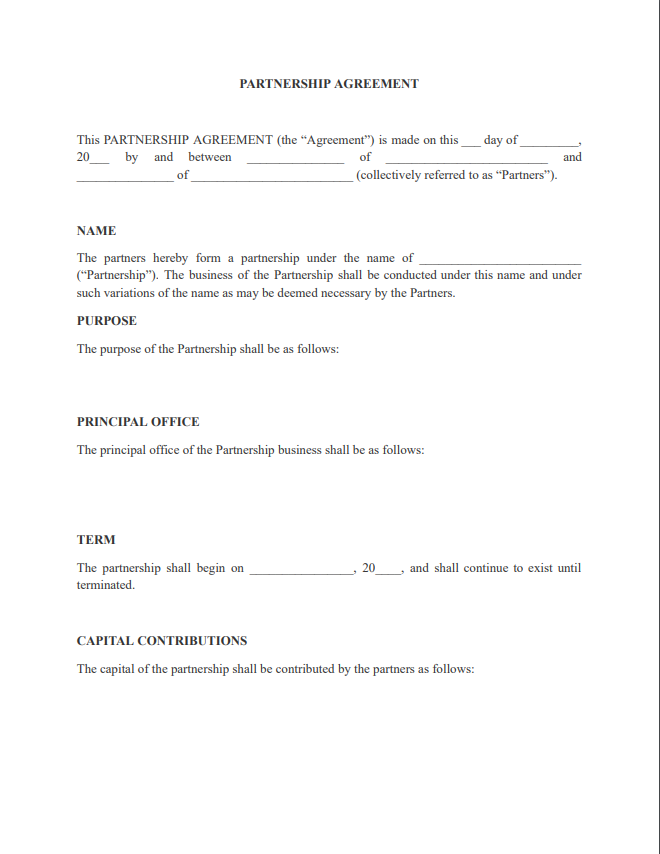A partnership agreement serves many purposes, two of the most important of which are getting everyone on the same page about dispute resolution and business structure:
- Dispute Resolution: Every relationship has disagreements, and this is especially true in relationships where lots of decisions have to be made.
A carefully crafted partnership agreement allows you to outline how disputes are going
to be handled ahead of time, instead of in the heat of the moment.
- Business Structure: The process of putting together a partnership agreement forces everyone to think about and get on the same page about how the business is going to be structured and run from the beginning. This minimizes misunderstandings down the road and hopefully prevents many issues from occurring at all.
Should you use a lawyer to put together your partnership agreement?
- If you can afford it, its almost always a good idea to have an attorney involved with your business agreements. However, most attorneys are going to bill you by the hour, and likely do not have the same level of knowledge about your partners that you do. Because of this, its always better to have a good outline of what you want in the agreement before speaking to a lawyer.
Here is an overview of the Elements that every partnership agreement should contain:
- The Basics
- The name of the company and any other names that the company will be operating under.
- Statement of the company’s purpose.
- Responsibilities
- Decide who is going to be responsible for which parts of the business.
- List out any other areas that need to be covered and decide who is going to be broadly responsible for those areas.
- Workload – Answer the following questions:
- How will the workload be shared?
- Are partners expected to work set hours?
- Does one partner plan on working more or less than the other partners?
- How much vacation is allowed?
- Will this be a full-time role for each partner or are partners allowed to conduct other types of business outside of the partnership?
- If so then what types of business are they allowed to conduct?
- Partner Contributions – You want to determine what each partner is bringing to the business in terms of:
- cash
- Investment
- physical property (equipment, office space, etc)
- intellectual/other types of property (software code, client lists, etc.)
You want to discuss restrictions if any, there are on those assets.
- Compensation – This section should answer the following questions:
- Will partners receive a salary?
- If so how much and when.
- If a partner is taking less salary will this be made up in the future?
- Do you plan on reinvesting profits back into the business?
- If so at what point do you plan on taking out profits?
- How and when will profits be divided up amongst the owners? (if based on ownership see next step) How will losses be handled?
- Ownership Split
- Now that you have decided on responsibilities, workload, and which partners are contributing what to the business, you can come to an agreement on how ownership is going to be shared in the business.
- Business Authority – This section should answer the following questions:
- Contracts: Does each partner have the authority to sign contracts on behalf of the business?
- Debt: Is the business going to have a credit line?
- Keep in mind here that, depending on the business structure that you choose, each partner may be personally liable for this.
- Spending: Does a partner have the ability to make purchases without consulting the other partners?
- (Generally there is a limit that is set in the agreement above which point the partner must obtain permission from the other partners.)
- Partner Death/Disability – What happens if a partner dies or becomes unable to participate at the same level because of a disability?
- Most business owners probably do not want their deceased partner’s heirs to be their new business partners.
- To prevent these types of issues a buy sell agreement shouldl be included.
- Partner Exit – Answer the following questions:
- Voluntary Exit: What happens if a partner wants to leave the partnership and pursue
- other interests?
- Involuntary Exit: Under what circumstances can a partner be forced to leave the business?
- These questions can also be handled in the buy sell portion of the agreement.
- Partner Disputes – Being able to discuss and come to an agreement on the differences of opinion that will arise in any business is a must for any good partnership. However, there will be times even in the best partnerships where you are not able to come to an agreement on a specific topic. Here are some ways that this can be handled:
- The CEO has the final say.
- One partner has the final say on a particular part of the business.
- For example on hiring and firing disputes it may be the CEO, for product development disputes the partner who is in charge of product has the final say.
- Vote based on ownership.
- Partners agree to use an outside mentor to resolve disputes.
- Partners agree to use an outside advisory board.
Other more formal options are:
- Mediation – Working with a professional mediator can help partners come to an agreement on issues that they were not able to alone.
- Arbitration – If you are not able to come to an agreement through mediation then Arbitration, which binds the partners to the decision made by the arbitrator, is the next option before going to court.
- Litigation – If things get this far arbitration is usually the more efficient option but if you want to have litigation as an option then define which state will have jurisdiction.
- New Partner
- What is the process for deciding on bringing in a new partner?
- Majority vote
- Selling the Business – Under what circumstances can the business be sold?
- This likely goes back to the buy-sell agreement.
Related Forms:
Other Forms
- Affidavit Forms
- Assignment Forms
- Attorney Forms
- Bankruptcy Forms
- Bill of Sales Forms
- Borrow, Lend & Collection Forms
- Business Forms
- Confidentially Forms
- Contract Forms
- Copyright Forms
- Corporation Forms
- Credit Form
- Declaration Form
- Deed Forms
- Divorce Forms
- Employment Forms
- Entertainment Contract Forms
- Family Law Forms
- Free Will Forms
- Government Form
- Health Care Forms
- Homestead Form
- Indemnity Agreement Form
- Intellectual Property Forms
- Internet Forms
- Landlord and Tenant Forms
- Lease and Rental Forms
- Letter Forms
- Limited Liability Co. Form
- Non-Compete Forms
- Non-Disclosure Forms
- Notice Forms
- Parental Permission Forms
- Partnership Forms
- Power of Attorney Forms
- Premarital Forms
- Promissory Notes
- Real State Forms
- Release Forms
- Sale & Purchase Forms
- Technology Forms
- Trademarks Forms
- UCC Forms
5/5
0
Downloads
"Formscatalog.com is my go-to-site for my templates and document needs."

Charles T. Bachman
Lawyer

